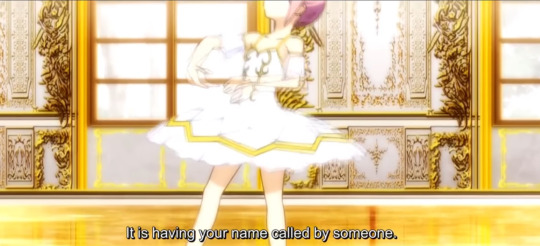#and then through this I realized the fairytale we may be getting inspo from next is Princess Kaguya
Explore tagged Tumblr posts
Text
Thinking about Buddhism as it relates to Madoka Magica, sadly for the first time as I have no personal frame of reference surrounding the religion as a white Canadian.
I think just as much as Madoka criticizes aspects of Christianity, it is also criticizing Buddhism. Namely that the salvation Buddhists seek in the pursuit of nirvana can rob us of our inherent human experience.
“According to Buddhist tradition, the Buddha taught that attachment or clinging causes dukkha (often translated as "suffering"), but that there is a path of development which leads to awakening and full liberation from dukkha”.
Huh. Attachment and clinging causes suffering… where have we seen-

Homura is the fairly straightforward unideal person in Buddhism. Attachment and clinging in Buddhism is called ‘tanha’, and there are three main pillars of it, each of which Homura represents in Rebellion (and the girls all represent with their wishes):
1. Kama-Tanha: Craving for sensory pleasures. These are usually material things and mostly associated with our base desires, like food, sex, wealth even, etc.
2. Bhava-Tanha: Craving to be something, to exist, to unite with an experience. This one is more difficult to understand; but it seems to relate to the idea of wanting to be important and exist in others’ lives and thoughts.
3. Vibha-Tanha: Craving for non-existence. The desire to not experience unpleasant things, and also the desire for self-annihilation (suicide). Homura exemplifies this one strongly.
Buddhists seek to distance themselves from these things in order to seek nirvana, the cessation of desire and thus of suffering. But when you are left without this ‘suffering’, you are also left without the beautiful things in life.

What is a life worth living without desires? What is life for a god who has no attachments? Madoka Magica through Homura, the antithesis to Buddhist ideals, asks this question blatantly in the Concept Movie Trailer.




What is happiness without delicious food and sunbeams (sensory kama pleasures) or connections and existence (bhava)?
Madoka’s existence as a so called enlightened being in heaven (nirvana) goes against what makes us human beings, and her own happiness in turn.
The cessation of desire, a driving force for basic human emotions, does little but make you emotionless and numb. It disconnects you from relationships. What then is to differentiate you from emotionless Incubators?
Attachment and clinging can bring despair to people like Homura in Rebellion. But in the right circumstances, attachment, desire - it brings happiness and love. It is happiness and love. Without suffering, there is no joy. Is an existence without joy worthwhile?
#and then through this I realized the fairytale we may be getting inspo from next is Princess Kaguya#but that’s for another post ;)#madoka magica#pmmm#madoka kaname#homura akemi#Buddhism in Madoka#madoka analysis
96 notes
·
View notes